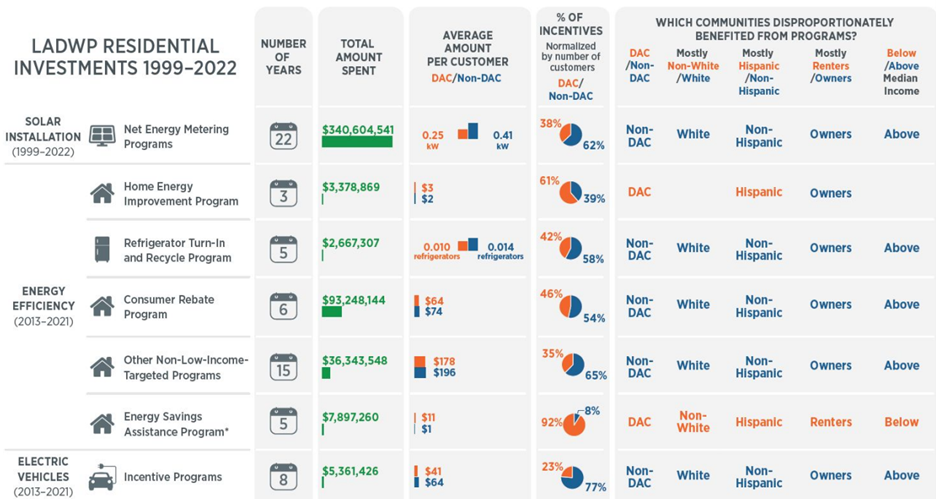
Equity in Los Angeles’ Clean Energy Transition
The LA100 initiative in Los Angeles marks a major advance towards reaching 100% renewable energy. But to guarantee that all communities benefit equally, targeted policies and active community engagement are essential.
Last April, I attended the American Planning Association (APA) National Planning Conference in Minneapolis on a Kleinman Center student grant. Amid the vibrant discussions on the evolving landscape of energy policy in the United States, one session stood out—a deep dive into Los Angeles’ Equity Strategies for LA’s Clean Energy Transition. This session underscored the critical need for policies that ensure all communities benefit equitably from clean energy initiatives, addressing the unique challenges faced by lower-income households and emphasizing the role of community involvement in achieving a just energy future.
Los Angeles’ LA100 plan, which aims to transform the city’s energy landscape by transitioning to 100% renewable energy was discussed. This goal presents challenges, particularly in ensuring lower-income households benefit equitably from clean energy initiatives. These households face a disproportionate impact from current energy rate structures and solar compensation mechanisms. They spend a larger percentage of their income on energy bills and are less likely to afford the upfront costs associated with renewable energy technologies. If existing rate and solar compensation structures continue, electricity bills are projected to increase more for low-income customers than for higher-income customers, highlighting the urgency of reforming energy policies to protect vulnerable populations.
To address these inequities, several policy solutions were discussed. Adjusting rate structures to ensure that low-income households are not disproportionately burdened by higher energy costs is crucial. For instance, shifting from solar net metering to solar net billing can more fairly distribute the costs and benefits of solar energy. Expanding programs that provide financial assistance to low-income households for their energy bills is also essential. This could include on-bill tariffs for heat pump water heaters and enhanced insulation, which help reduce overall energy consumption and costs. Additionally, providing targeted incentives for low-income households to access renewable energy technologies can significantly improve equity. This could involve subsidies for rooftop solar installations or participation in community solar programs.
The session also highlighted the LA100 study by the Los Angeles Department of Water and Power (LADWP) and the National Renewable Energy Laboratory (NREL), offering insights into achieving 100% renewable energy in Los Angeles. By 2035, the scenarios project a 84%–100% reduction in greenhouse gas emissions from power plants compared to 2020. NREL’s approach included forming a steering committee with 14 community-based organizations, conducting listening sessions with over 100 low-income, energy-burdened households, and establishing an advisory committee with city council offices, agencies, and nonprofits.

These efforts aimed to gather insights on energy equity and develop strategies resonating with community priorities like affordability, technology access, health and safety, job development, and inclusive involvement. The session also discussed initiatives like the Shared Solar program, which has higher participation among wealthier communities. Offering a low-income discount rate could increase capacity and deliver savings to multifamily, renter, and low-income households. Compared to low-income rooftop solar, Shared Solar with a discount rate can support five times more capacity for the same investment. Housing weatherization and resilience are also critical, with direct installations of heat pump cooling for low-income households ensuring safety and comfort, especially in multifamily buildings.
The LA100 plan in Los Angeles represents a significant step towards achieving 100% renewable energy. However, ensuring that all communities benefit equitably requires targeted policies and active community involvement. Los Angeles’ experience offers valuable lessons for other cities aiming to undertake similar transitions. By implementing rate reforms, enhancing bill assistance programs, and providing targeted incentives, cities across the country can promote a more inclusive and just energy transition. As Los Angeles paves the way, its strategies demonstrate that with thoughtful policy and community engagement, a fair and equitable clean energy future is within reach for everyone.
Yueqi Tiffany Luo
Master of City Planning, Weitzman SchoolYueqi Tiffany Luo is a Master of City Planning student passionate about innovating climate solutions and urban infrastructures. As a planner, she aims to create livable, equitable, and sustainable cities that not only function well, but also inspire and uplift those who call them home.

